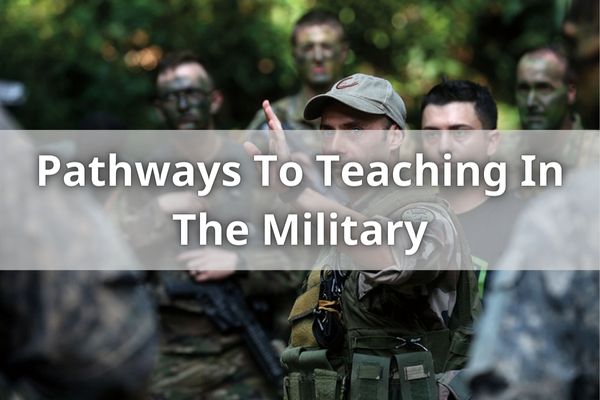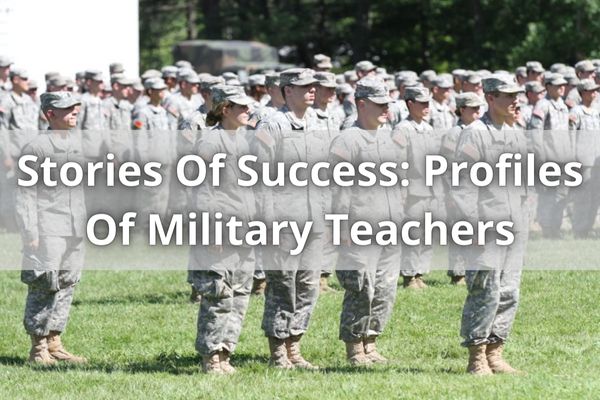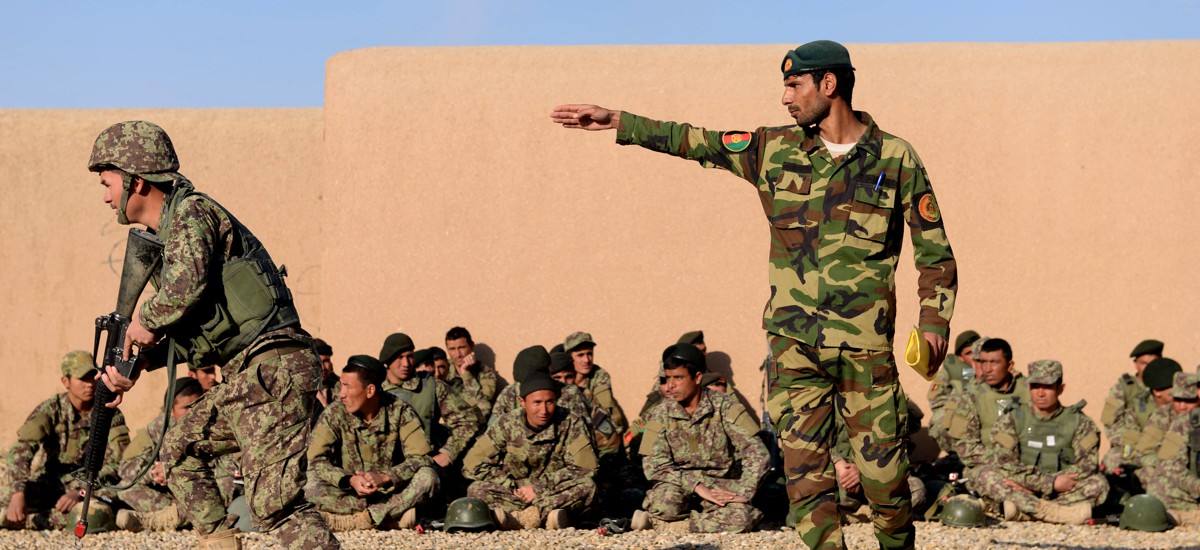Teaching Careers In the Military: A Comprehensive Guide
Teaching careers in the military offer a unique experience for those looking to make an impact on the lives of others. These jobs offer more than just financial compensation; they also give employees the chance to improve their talents and learn important information that they may use in careers outside of the military.
The qualifications for becoming a teacher in the military, the many teaching roles that are available, and the benefits of each will all be covered in this essay. We will also talk about the initiatives that are already in place that service people may use to advance their education and job chances.
Introduction
Military service is vital because education may provide members of the armed services useful skills. Teaching within the military offers a variety of unique opportunities and challenges to make a difference in how soldiers learn and prepare for their mission. Being able to adapt quickly and remain flexible is essential when teaching in this environment because schedules are often unpredictable and changing rapidly.
As such, teachers must be ready to adjust their lesson plans on short notice if needed. With these considerations in mind, there’s no shortage of potential for those who wish to pursue a rewarding career teaching within the military.
Types Of Teaching Positions In The Military
Teaching in the military has a variety of career paths for educators, depending on their area of expertise and experience. From teaching at Department of Defense Education Activity (DoDEA) schools to training future officers at Service Academies, there are many different ways to serve with an educational background.
These types of positions include:
- Civilian Educator Positions: DoDEA teachers have roles and responsibilities that vary depending on the type of school they teach in, as well as the subjects they focus on.
- Military Instructor Positions: Service academies provide specialized education to train future officers while technical and specialty schools offer vocational and technical training.
- Military Language Instructors: DLI and other language programs require instructors to possess a high level of proficiency in one or more languages.
- JROTC, ROTC, and Drill Sergeant Positions: These positions have specific requirements and qualifications that must be met before employment is granted.
With so many options available for educators looking to pursue a career in the military, it is important for them to research each path thoroughly to determine which would best suit their needs.
Pathways To Teaching In The Military

The journey of transitioning to teaching in the military can be a daunting one. However, with all the support and programs available – such as Direct Commission Programs, Transitioning from Active Duty to Teaching, Civilian Educators Entering the Military System, and the Troops to Teachers Program – it doesn’t have to feel like an insurmountable task.
Direct Commission Programs provide teachers who already possess certification or degrees in education a direct path into the military structure.
Meanwhile those that are active duty personnel may apply for transition through their respective branch of service.
For civilian educators interested in entering the military system there is also entry-level commissioning options.
Finally, veterans may take advantage of the Troops to Teachers program which assists them in finding employment opportunities within educational institutions either at home or abroad while allowing them to use their specialized skills they acquired during their time of service. This program also offers financial assistance and other resources throughout the process.
With these pathways open, transitioning into teaching in the military becomes achievable!
Benefits Of Teaching In The Military
Teaching in the military offers a number of unique benefits.
Job security and stability is one major perk; unlike most civilian jobs, once you join the military it can be difficult to leave due to contractual obligations. This provides teachers with an extra layer of job protection as well as assurance that their career won’t stagnate over time.
Additionally, teacher salaries in the military are highly competitive when compared to those offered in other fields. Benefits like health insurance, housing allowance, educational assistance, and retirement packages increase this value even more.
Military teaching careers also bring plenty of opportunities for personal growth and development. Teachers have ample chances to further their education or specialize within certain areas while serving in the armed forces.
Furthermore, since many military schools serve students from all around the world, educators may get exposed to different cultures and customs first-hand through social interactions with their students. Moreover, members may travel across countries on work assignments which can be highly beneficial both professionally and personally.
All these experiences create a vast network for teachers looking for future employment prospects outside of the military.
Overall, teaching in the military offers unparalleled job security coupled with excellent monetary rewards and plenty of room for personal evolution – making it an attractive option for anyone interested in pursuing such a career path.
How To Prepare For A Teaching Career In The Military?
Teaching in the military can be an incredibly rewarding and challenging experience. But before you embark on this journey, it’s important to understand what it takes to prepare for a career in this field. Here are some key ways to get started:
- Education and Certifications – Most teaching positions in the military require at least a bachelor’s degree and specialized certifications relevant to the curriculum being taught. Be sure to research any requirements specific to your desired position prior to applying.
- Experience – Gaining hands-on experience is essential when seeking a teaching role within the military. Consider volunteer opportunities or internships that may help build out your resume and give you valuable insight into instruction methods used by other educators.
- Networking – The power of networking should not be underestimated! Reach out to current teachers working in the military for advice or mentorship as you pursue your career goals. They can provide invaluable guidance throughout your job search process and beyond.
- Resume/Application Prep – Crafting an effective resume and application package will demonstrate that you have taken the time necessary to become knowledgeable about what employers look for when assessing potential candidates. Make sure yours reflects all your education, training, experiences, certifications, special awards, etc., that qualify you for the role you desire most.
By understanding these components of preparation, individuals hoping to pursue a teaching career in the military can develop sound strategies for success — leading them one step closer towards achieving their dreams!
Resources For Aspiring Military Teachers
For those interested in pursuing a teaching career in the military, there are many resources available to them.
Military education and training programs offer an excellent foundation for aspiring teachers. These programs can provide rigorous classroom instruction as well as hands-on experience that will prepare students for their future endeavors. Furthermore, scholarships and financial aid opportunities are also available so applicants can further pursue their educational goals without having to worry about the cost of tuition or other expenses related to attending school.
Job boards and hiring events are also helpful tools for finding teaching positions within the military. These platforms allow individuals to search for jobs with ease and find out more information about the position they’re interested in applying for.
Finally, professional development and training opportunities are essential for any prospective teacher looking to stay competitive in today’s workforce. Such courses may include topics such as leadership skills, instructional strategies, curriculum design and assessment techniques – all of which can help educators excel at their craft.
Stories Of Success: Profiles Of Military Teachers

Military teaching is an incredibly rewarding career for educators. Through interviews with current and former military teachers, it’s clear that the experience of helping service members grow as individuals has a lasting impact on their lives—and on the life of any teacher involved.
These stories of success demonstrate how these dedicated professionals have used their time in the military to help shape young minds and learn valuable skills themselves.
From working closely with students to collaborating with other instructors, teaching in the military can provide personal and professional growth opportunities unlike any civilian job.
Whether they’re providing direct instruction or offering mentorship, educators who serve often find themselves using new methods and techniques to reach learners from all walks of life.
With tips and advice from experienced educators, anyone considering this path will be able to make an informed decision about what kind of educator they want to become.
Overcoming Challenges In Military Teaching
Military teaching comes with unique challenges that require resilience and adaptability.
From frequent relocation to dealing with classroom management while following military protocol, military teachers must be prepared for the unexpected.
But one of the greatest challenges is learning how to navigate cultural differences in overseas assignments.
Understanding these diverse cultures can help create a successful environment for both teachers and students alike.
Being aware and respectful of local customs can also further enhance communication between teacher and student, as well as reduce any potential conflicts that may arise due to misunderstandings or lack of familiarity with certain traditions.
Military-connected students have special needs that need to be addressed in order to ensure their success, so it’s important for teachers to be familiar with various resources available from the Department of Defense Education Activity (DoDEA) which provides support services like counseling, tutoring programs, and more.
Educators should also take advantage of workshops and webinars specifically geared towards helping military families stay connected during deployments.
Conclusion
Teaching careers in the military offer many rewarding experiences and opportunities for those considering a career change. Not only do service members gain valuable expertise through their teaching positions, but they also have the chance to make a lasting impact on others’ lives. The need for dedicated educators in the military community is ever-present; those who pursue such roles can be assured that their contributions will be invaluable.
A teaching career in the military offers an opportunity to serve your country while doing meaningful work. With competitive salaries and benefits packages, these types of jobs are attractive options for experienced educators or individuals looking to break into this field of work.
It’s important to remember that each career path comes with its own unique set of challenges and rewards – so don’t hesitate to explore this option if you’re feeling called to it!







